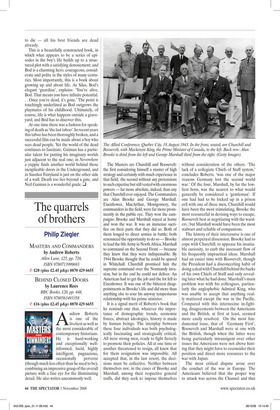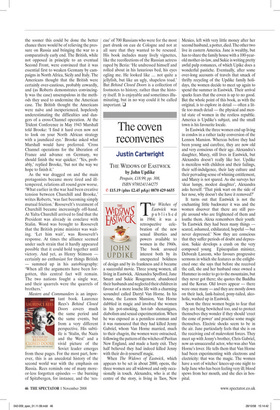The quarrels of brothers
Philip Ziegler
MASTERS AND COMMANDERS by Andrew Roberts Allen Lane, £25, pp. 720, ISBN 9780713999693 ✆ £20 (plus £2.45 p&p) 0870 429 6655 BEHIND CLOSED DOORS by Laurence Rees BBC Books, £20, pp. 448, ISBN 9780563493358 ✆ £16 (plus £2.45 p&p) 0870 429 6655 Andrew Roberts is one of the liveliest as well as the most considerable of contemporary historians. He is hard-working and exceptionally wellinformed, lucid, highly intelligent, pugnacious, occasionally perverse (though much less often than he used to be), combining an impressive grasp of the overall picture with a fine eye for the illuminating detail. He also writes uncommonly well. The Masters are Churchill and Roosevelt: the first considering himself a master of high strategy and certainly with much experience in that field; the second without any pretensions to such expertise but still vested with enormous powers — far more absolute, indeed, than any that Churchill ever enjoyed. The Commanders are Alan Brooke and George Marshall. Eisenhower, MacArthur, Montgomery, the commanders in the field, were far more prominently in the public eye. They won the campaigns: Brooke and Marshall stayed at home and won the war. It was an immense sacrifice on their parts that they did so. Both of them longed to direct armies in battle; both renounced the opportunity to do so — Brooke to lead the 8th Army in North Africa, Marshall to command on the Second Front — because they knew that they were indispensable. By 1944 Brooke thought that he could be spared in Whitehall. Churchill promised him the supreme command over the Normandy invasion, but in the end he could not deliver. An American had to get the job and the lot fell to Eisenhower. It was one of the bitterest disappointments in Brooke’s life and did more than anything else to sour his anyway tempestuous relationship with his prime minister.
It is a signal merit of Roberts’s book that he reminds one that, whatever the importance of demographic trends, economic forces, abstract ideologies, history is made by human beings. The interplay between these four individuals was both psychologically fascinating and strategically critical. All were strong men, ready to fight fiercely to promote their policies. All at one time or another threatened to resign, all knew that for them resignation was impossible. All accepted that, in the last resort, the decisions must be collective. Neither between themselves nor, in the cases of Brooke and Marshall, among their respective general staffs, did they seek to impose themselves without consideration of the others. ‘The lack of a collegiate Chiefs of Staff system,’ concludes Roberts, ‘was one of the major reasons Germany lost the second world war.’ Of the four, Marshall, by far the lowliest born, was the nearest to what would generally be considered a ‘gentleman’. If one had had to be locked up in a prison cell with one of these men, Churchill would have been the most stimulating, Brooke the most resourceful in devising ways to escape, Roosevelt best at negotiating with the warders ; but Marshall would have been the most stalwart and reliable of companions.
The history of their intercourse is one of almost perpetual dissension. Brooke had to cope with Churchill, to appease his insatiable curiosity, to curb the incessant flow of his frequently impractical ideas. Marshall had an easier time with Roosevelt, though the President had a disconcerting habit of doing a deal with Churchill behind the backs of his own Chiefs of Staff and only revealing later what he had done. Marshall’s main problem was with his colleagues, particularly the anglophobic Admiral King, who was unable to accept that anything really mattered except the war in the Pacific. Compared with this internecine in-fighting, disagreements between the Americans and the British, at first at least, seemed more easily resolved. On the most fundamental issue, that of ‘Germany First’, Roosevelt and Marshall were at one with the British, though when the latter were being particularly intransigent over other issues the Americans were not above hinting that they might have to reconsider their position and direct more resources to the war with Japan.
The most critical dispute arose over the conduct of the war in Europe. The Americans believed that the proper way to attack was across the Channel and that the sooner this could be done the better chance there would be of relieving the pressure on Russia and bringing the war to a comparatively early end. The British, while not opposed in principle to an eventual Second Front, were convinced that it was essential first to weaken Germany by campaigns in North Africa, Sicily and Italy. The Americans thought that the British were certainly over-cautious, probably cowardly, and (as Roberts demonstrates convincingly was the case) unscrupulous in the methods they used to undermine the American case. The British thought the Americans were naïve and inexperienced, hopelessly underestimating the difficulties and dangers of a cross-Channel operation. At the Trident Conference in May 1943 Marshall told Brooke: ‘I find it hard even now not to look on your North African strategy with a jaundiced eye.’ Brooke asked what Marshall would have preferred. ‘Cross Channel operations for the liberation of France and advance on Germany, we should finish the war quicker.’ ‘Yes, probably,’ replied Brooke, ‘but not the way we hope to finish it.’ As the war dragged on and the main protagonists became more tired and illtempered, relations all round grew worse. ‘What earlier in the war had been creative tension between Churchill and Brooke,’ writes Roberts, ‘was fast becoming simply mutual friction.’ Roosevelt’s treatment of Churchill became increasingly off-hand. At Yalta Churchill arrived to find that the President was already in conclave with Stalin. Word was brought to Roosevelt that the British prime minister was waiting. ‘Let him wait’, was Roosevelt’s response. At times the alliance seemed under such strain that it hardly appeared possible that it could hold together until victory. And yet, as Henry Stimson — certainly no enthusiast for things British — summed up in his autobiography: ‘When all the arguments have been forgotten, this central fact will remain. The two nations fought a single war, and their quarrels were the quarrels of brothers.’ Masters and Commanders is an important book. Laurence Rees’s Behind Closed Doors covers much the same period and the same events, but from a very different perspective. His subtitle is ‘Stalin, the Nazis and the West’ and a vivid picture of the Soviet leader emerges from these pages. For the most part, however, this is an anecdotal history of the second world war with the emphasis on Russia. Rees reminds one of many moreor-less forgotten episodes — the burning of Spitzbergen, for instance, and the ‘res cue’ of 700 Russians who were for the most part drunk on eau de Cologne and not at all sure that they wanted to be rescued. His book includes many lively vignettes, like the recollections of the Russian actress raped by Beria: ‘He undressed himself and rolled about in his luxurious bed, his eyes ogling me. He looked like ... not quite a jellyfish, but like an ugly, shapeless toad.’ But Behind Closed Doors is a collection of footnotes to history, rather than the history itself. It is enjoyable and sometimes illuminating, but in no way could it be called important. q



































































































 Previous page
Previous page